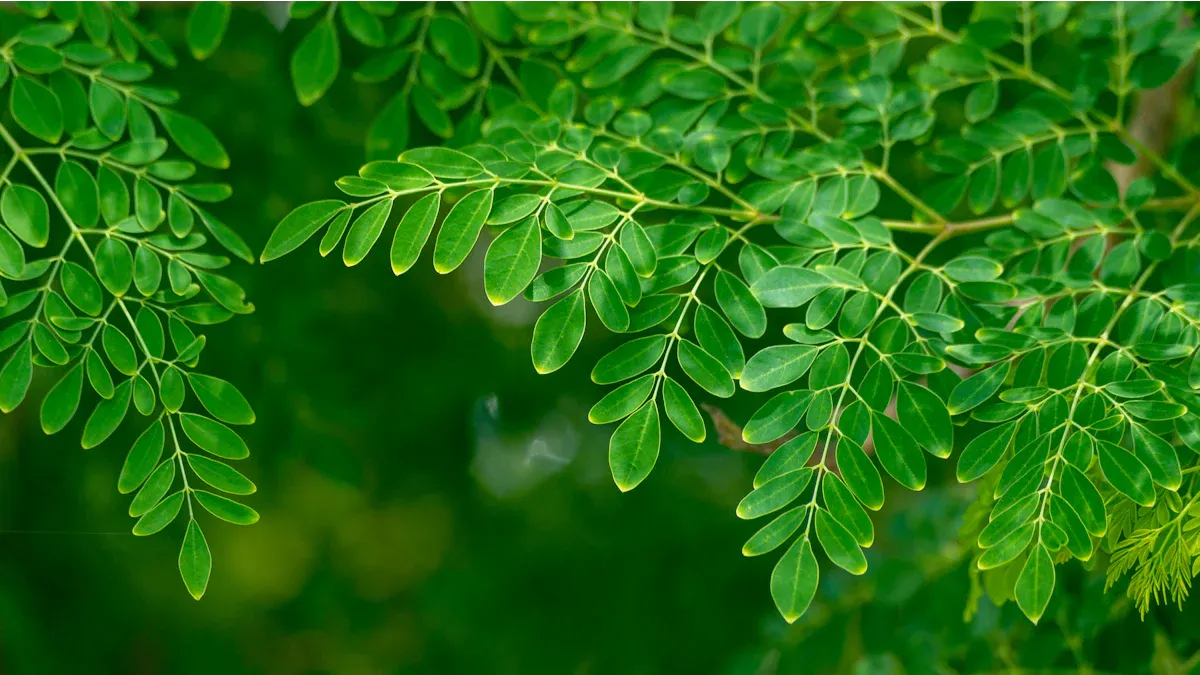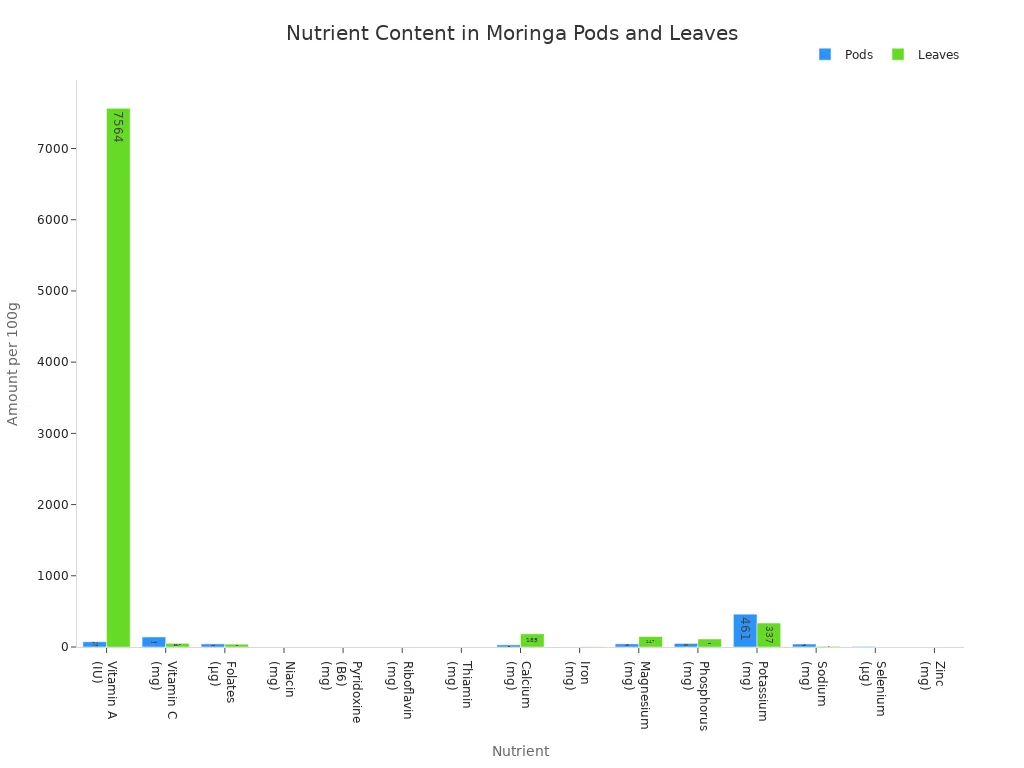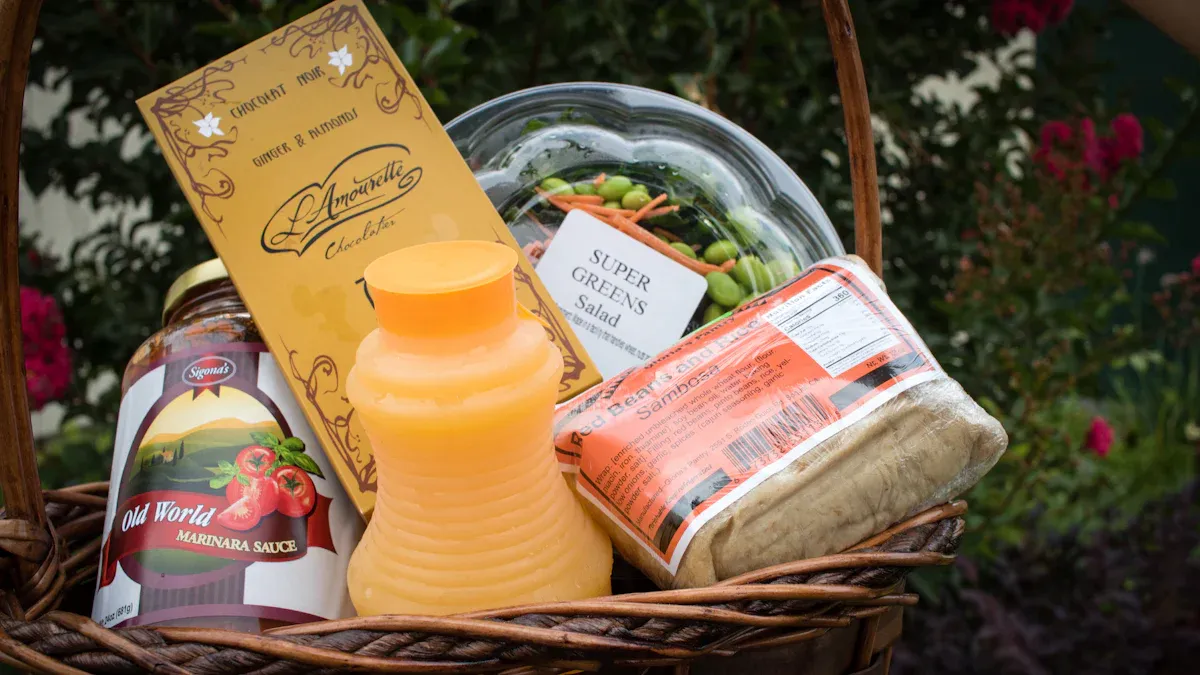T: +86-731-89865681
E: info@kingherbs.com
E: info@kingherbs.com
27Fl, Blding A, Cimen Fun City, Wanjiali Road, Changsha 410014, Hunan, China
Views: 0 Author: Site Editor Publish Time: 2025-07-17 Origin: Site
You might know the horseradish tree as moringa, drumstick tree, or miracle tree. People like moringa oleifera because it grows fast and is full of healthy things. The drumstick tree is special for its great nutrition. It has more vitamin A than carrots. It has seven times more vitamin C than oranges. Here is how moringa compares to other foods:
You can find moringa products almost everywhere now. In 2023, the world market for moringa oleifera supplements was almost $8 billion. Experts think it will more than double by 2033. The horseradish tree gives health benefits and helps you feel good. It fits into many diets. People use every part of the drumstick tree, like leaves and seeds, because they grow fast and are useful.
Moringa oleifera is also called the horseradish or drumstick tree. It has lots of vitamins, minerals, and protein. These help people stay healthy and strong.The leaves, pods, and seeds have antioxidants and anti-inflammatory compounds. These can help lower blood sugar. They also help reduce swelling and make the immune system stronger.People use moringa in many ways. It can be food or a supplement. It is used for cleaning water and for skin care. This makes moringa a very useful superfood.Old and new research show moringa can help heal some health problems. It may help with infections, joint pain, and long-lasting diseases.Moringa is usually safe if you use it the right way. Start with small amounts. Pick good quality products from trusted places.

The horseradish tree is full of nutrients. Its leaves, pods, and seeds are very healthy. If you want more vitamins and minerals, moringa is a smart pick. The leaves have more vitamin A than carrots. They also have more iron than spinach. You get vitamin C, B vitamins, and minerals like calcium, magnesium, and potassium from moringa. Here’s a simple table showing what is in moringa:
Nutrient / Vitamin / Mineral | Pods (per 100 g) | Leaves (per 100 g) |
|---|---|---|
Vitamin A (IU) | 74 | 7564 |
Vitamin C (mg) | 141 | 51.7 |
Calcium (mg) | 30 | 185 |
Iron (mg) | 0.36 | 4.00 |
Magnesium (mg) | 45 | 147 |
Potassium (mg) | 461 | 337 |
Both the leaves and pods have lots of good stuff. The pods have a lot of vitamin C and potassium. This makes moringa helpful for people who need better nutrition. It can help fight hunger and make food more healthy.
Moringa oleifera leaves have a lot of protein. They have more protein than most leafy greens. The protein can be up to 40%. You get all nine important amino acids from it. This means moringa can help you get protein, even if you do not eat meat. The pods and seeds also add more nutrition.
Moringa is known for its antioxidants. The leaves have flavonoids, phenols, and carotenoids. These antioxidants protect your body from free radicals. Free radicals can hurt your cells. Scientists say moringa’s antioxidants can lower the risk of some diseases. These include diabetes, heart disease, and cancer. The nutrients in moringa, especially in the pods and leaves, help keep you healthy.
Eating moringa oleifera gives you many health benefits. Studies show moringa can lower blood sugar and cholesterol. It can also help with swelling and boost your immune system. People use the drumstick tree to fight hunger in many places. The pods, leaves, and seeds are full of good nutrients. This makes moringa a strong choice for better health.

You can eat moringa in many ways, like powder, tea, or capsules. The horseradish tree does more than just give you nutrients. It is a superfood that helps your health, fights hunger, and adds value to your meals.
People have used moringa oleifera for healing for a long time. In South Asia and Africa, families share this knowledge with each new generation. Almost every part of the moringa tree is used for medicine. People use the leaves, seeds, bark, roots, and flowers for different health needs. Here’s a table that shows how people in different places use the horseradish tree:
Region | Traditional Medicinal Uses | Plant Parts Used | Additional Uses |
|---|---|---|---|
South Asia | Used in Ayurveda, Unani, and other healing traditions for nutritive, strengthening, and protective properties; treatment of asthma, diabetes, ulcers, infections, cancer | Bark, sap, roots, leaves, seeds, flowers | Water purification |
Africa | Used similarly for traditional medicine and water purification | Bark, sap, roots, leaves, seeds, flowers | Water purification |
Moringa oleifera is important in traditional healing. In India, people use the leaves to give energy and help with pain. Warriors ate the leaves to feel better after stress. If someone had a cold or flu, they drank boiled moringa leaves. Mothers sometimes use the flowers to help with breastfeeding. The oil from the seeds is used for fungal and joint infections. The bark can help with joint pain too. Some families use the plant to help heal cuts and scrapes. The name “Miracle Tree” fits because it helps in so many ways.
Did you know? Elders often share moringa knowledge through stories and daily life. This keeps the healing wisdom alive.
Scientists now study moringa oleifera to learn why it works. Recent research shows moringa has many helpful compounds. These include flavonoids, polyphenols, vitamins, and special proteins. These things help your body in many ways. Studies show moringa acts as an antioxidant and protects your nerves. It can also help your immune system. Some research says moringa can lower blood sugar and cholesterol. It also helps your skin and may fight infections.
Here’s a table with some main bioactive compounds in moringa and what they do:
Bioactive Compound Class | Specific Compounds / Examples | Medicinal Effects / Roles |
|---|---|---|
Flavonoids | Apigenin, Quercetin, Luteolin, Myricetin, Kaempferol | Antioxidant, hepatoprotective, wound healing |
Lignans | Secoisolariciresinol, Isolariciresinol, Medioresinol, Epipinoresinol glycosides | Antioxidant activity |
Phenolcarboxylic acids | Coumaroylquinic, Caffeoylquinic, Feruloylquinic acids | Antioxidant activity |
Carotenoids | Lutein, Zeaxanthin, β-carotene | Antioxidant, cellular protection |
Alkaloids | Various unspecified alkaloids | Cardiac stimulation, blood pressure regulation, lipid lowering |
Glucosinolates & Isothiocyanates | 4 (alpha-L-rhamnosyloxy)-benzyl isothiocyanate, Niazimicin, Niazirin | Anticancer, antimicrobial, antifungal |
Proteins and Peptides | Peptide fractions rich in aromatic and hydrophobic amino acids | Anticancer, antibacterial, antioxidant, hepatoprotective, antidiabetic |
Sterols | Beta-sitosterol and derivatives | Anticancer activity |
These compounds give you many health benefits. Scientists keep finding new ways moringa oleifera helps with healing. Many people now use moringa powders and supplements to stay healthy.
If you have swelling or pain, moringa oleifera may help. This plant helps your body fight inflammation naturally. Animal studies show moringa can lower swelling and pain. It works by lowering chemicals in your body that cause inflammation, like TNF-α, IL-6, and IL-1β. It also raises anti-inflammatory mediators such as IL-10.
Researchers compared moringa oleifera to common anti-inflammatory drugs. They found moringa works well and is gentle on your cells. The plant’s polyphenols and flavonoids give it strong anti-inflammatory powers. In animal tests, moringa extracts lowered swelling in different ways, like paw edema and granuloma. Some studies show moringa can help with long-term inflammation and pain.
Tip: If you want a natural way to help with inflammation, moringa oleifera is a good choice. It gives anti-inflammatory benefits and helps your immune system.
You can use moringa as powder, tea, capsules, or oil. People use it for wound care, joint pain, and to help their bodies heal after injuries. The anti-inflammatory effects make moringa oleifera a great part of your health routine.

You can find moringa in kitchens all over the world. People use the leaves, seeds, and pods in many recipes. The leaves go into soups, salads, and smoothies. You might see them in bread, biscuits, cakes, and even pasta. Some cultures add drumstick pods to curries and stews. The seeds can be roasted and eaten as snacks. When you add moringa to your food, you get more protein, vitamins, and minerals. The edible parts boost the nutrition in your meals and help protect against iron deficiency. Moringa oleifera also brings antioxidants and helps your body fight stress. Many families use it to make food last longer and taste better.
Moringa leaves and pods add flavor and color to dishes.
Seeds and pods help improve the shelf life of baked goods.
Adding moringa to your diet supports your health and energy.
Did you know you can use moringa seeds to clean water? The seeds work as natural filters. They remove dirt, germs, and even some heavy metals from water. Here’s a quick look at how well moringa oleifera seeds work:
Parameter | Result with Moringa Seeds | Details |
|---|---|---|
Turbidity Reduction | 80% to 99.5% | Water becomes much clearer |
Bacterial Load Reduction | Up to 99.99% | Fewer harmful germs in the water |
pH Impact | No major change | Water stays safe to drink |
Antibacterial Activity | Strong | Stops bacteria like Salmonella and Shigella |
Cost and Environment | Low-cost, eco-friendly | Good for homes and communities |
You just crush the seeds and mix them with water. The proteins in the seeds grab onto dirt and germs, making them clump together and sink. This makes the water cleaner and safer to drink. Moringa oleifera seeds offer a simple, green way to help families get clean water.
Moringa seeds are full of oil, called Ben oil. This oil has a light taste and works well for cooking. You can use it like olive oil. Ben oil is also great for your skin and hair. It goes into soaps, shampoos, and lotions. The oil does not spoil easily and keeps its quality for a long time. People use it as a machine lubricant and even in perfumes. After you press the oil out, the leftover seed cake can clean water or feed plants as fertilizer. The pods and shells also find use as natural scrubbers.
Kingherbs Limited supplies moringa products in many forms. You can get extracts, powders, capsules, tablets, teas, and premixes. Kingherbs holds certifications like FSSC, ISO9001, KOSHER, HACCP, and HALAL. They help you find quality moringa oleifera products for food, health, and industry.
You might wonder if moringa oleifera is safe for you. Good news! Clinical studies show that moringa oleifera leaf extracts and powders are very safe for most people. Researchers tested these products in humans and found no harmful side effects. People in the studies even saw health benefits like lower blood sugar and cholesterol. Still, you should always start with a small amount if you are new to moringa. If you have a health condition or take medicine, talk to your doctor first. Pregnant women should avoid moringa root and bark, as these parts may not be safe.
Tip: Always choose high-quality moringa products from trusted suppliers to make sure you get pure and safe ingredients.
You might ask, “How much moringa should I take?” Studies tested moringa leaf powder in amounts like 2.4 grams (about 1 teaspoon), 4.8 grams (2 teaspoons), and 7.2 grams (3 teaspoons) each day. Most adults can handle these amounts without problems. If you take more than 7 grams a day, you might get a mild upset stomach, but this usually goes away quickly. There are no official rules for how much to give children. Experts say you should start with a small dose and see how your body feels.
Start with 1 teaspoon of moringa leaf powder per day.
Increase slowly if you feel good.
Stop or lower the dose if you notice any stomach issues.
Most people can enjoy moringa oleifera without trouble, but a few people have had allergic reactions. Some rare cases include swelling, trouble breathing, or even anaphylactic shock after eating moringa seeds or leaves. Workers who handle moringa seed powder sometimes get asthma-like symptoms, such as coughing or chest tightness. If you have allergies to plants or pollen, you should be extra careful. If you ever feel itchy, have swelling, or find it hard to breathe after using moringa, stop right away and get medical help.
Note: Allergic reactions to moringa are rare, but they can happen. Always listen to your body and stay safe.
Moringa oleifera is great for your health and daily life.
It gives you protein, vitamins, and minerals to keep you strong.
Oleifera helps with blood sugar, swelling, and cleaning water.
Many people use oleifera in food, pills, and other products because it grows quickly and can live in many places.
Always pick good quality oleifera from trusted brands like Kingherbs Limited. Ask your doctor before using oleifera, especially if you have health problems.
Moringa leaves taste a bit like spinach with a hint of pepper. The pods, called drumsticks, have a mild, green flavor. You can add them to soups, salads, or smoothies for a fresh boost.
Yes, you can eat moringa daily. Many people add the powder to smoothies or sprinkle it on food. Start with a small amount and see how your body feels.
You can mix moringa powder into water, juice, or smoothies. Try adding it to yogurt, oatmeal, or baked goods. It blends well and gives your food a green color and extra nutrition.
Moringa is safe for most kids when used in small amounts. Always start with a tiny portion. If your child has allergies or health issues, talk to your doctor first.
You can find moringa products online or in health stores. Look for trusted brands like Kingherbs Limited. They offer powders, capsules, teas, and more. Always check for quality certifications.